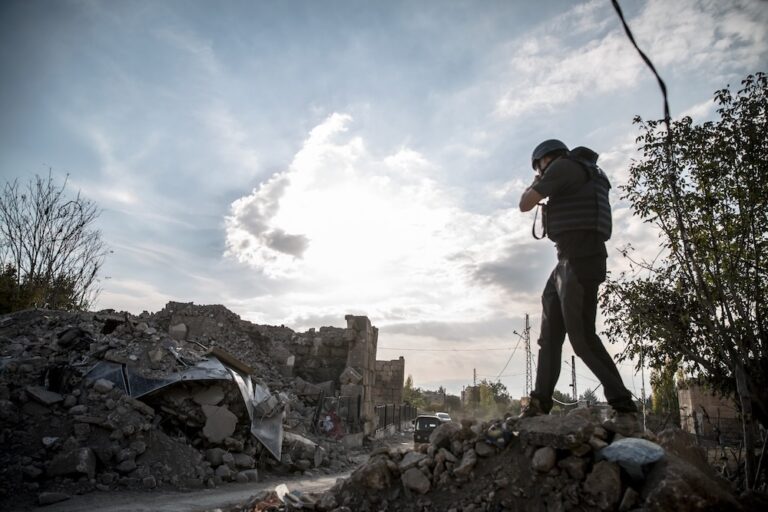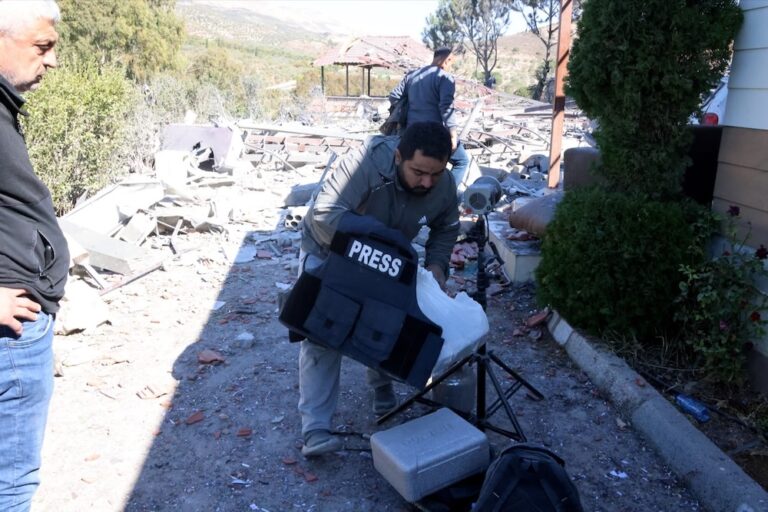In cooperation with UNESCO's regional office in Beirut, Maharat Foundation launched its annual report on the status of freedom of expression and opinion in Lebanon for the year 2008.
(MAHARAT/IFEX) – Beirut, 20 May 2009 – In cooperation with UNESCO’s regional office in Beirut, Maharat Foundation launched its annual report on the status of freedom of expression and opinion in Lebanon for the year 2008.
The points that the report raised can be summarized in three areas.
The first area addressed the opinions of the journalists about the circumstances of their profession in order to examine this career from an insider’s point of view. The result was that there is a difference between an insider’s vs. an outsider’s view. The journalists expressed their concerns on different issues.
A. The journalists were critical of their work circumstances and complained about the lack of freedom in their institutions.
B. The journalists said that they lack freedom in the field and are afraid to address certain issues.
C. The journalists complained about the lack of social guarantees, such as good salaries and social security services.
D. The journalists complained of their syndicate status and the absence of an active syndicate committee to improve their work and living situation.
The report noted strong suffering among journalists that was not previously apparent. This poses a serious threat to the freedom of journalists and their work.
The second area studied the level of freedom in the Lebanese press through indicators such as: the current laws, the practices that inhibit journalists’ work, different obstacles, in addition to the journalists’ own opinion concerning their work situation. The results showed that the Lebanese media is “partially free” and falls between “free” and “not free”. In addition, the legal reality is more positive than the practical reality.
The third area addressed the areas of weakness in the Lebanese media, among which are the following:
A. The political and religious division that is reflected in the audiovisual media law.
B. The financial crisis that is suffered by media institutions and that is reflected in the weakening of the advertisement field, which has affected the Lebanese media negatively and pushed it to seek other sources of funding such as political ones thus resulting in media becoming a follower.
C. Worsening of the media message: media institutions seem to be far from playing their role of providing a space for freedom and dialogue between the different constituents of society. Indeed, instead of acting to prevent violence and conserve local peace, media have become the first tool of conflict among the political, religious, military, and financial forces. This is strongly reflected in the language of violence.
In addition, there is a decrease in the quality of TV shows as the “decent” ones are aired outside prime time. As for political talk shows, they are now resulting in a worsening of the level of political culture and dialogue and the acceptance of others.
D. The obstacles to freedom in the Lebanese law: there are many obstacles placed on freedom of expression and press and these obstacles do not serve the Lebanese democracy and counteract the wider understanding of freedom of expression and speech as defined in the international laws that Lebanon complies to.
Some noteworthy legal gaps include:
– limiting the freedom of issuing printed material through clause 74 issued in 13/4/1953. This clause specified the number of political printed media to 25 dailies and 20 non dailies. This poses a serious limitation in the face of launching new political printed media in Lebanon.
– censorship of foreign media
– Jail terms in some cases of printed media crimes
– the absence of a law that guarantees free access to information
– the process for appointment of the national council of media that alienates its role and its meaning.
In conclusion, the actual reality of the Lebanese media contradicts the bright traditional picture. The report draws attention to the alarming worsening in media work and the lack of journalists’ freedom and worsening of their work circumstances and lack of social guarantees.
The result of the survey as shown in the report shows a different face of the Lebanese media: followership, lack of freedom of expression for many journalists, lack of critical role, and deterioration of the role of media as a public service. This was apparent from the journalists’ own opinions who were craving for serious reforms.
The results of this report are alarming and call for a group reaction in more than one area in order to remedy to the situation.


